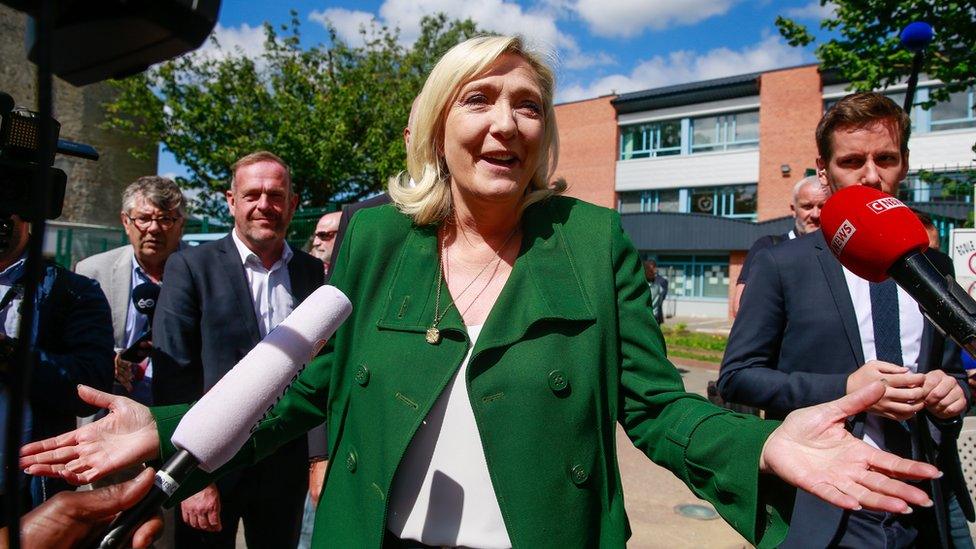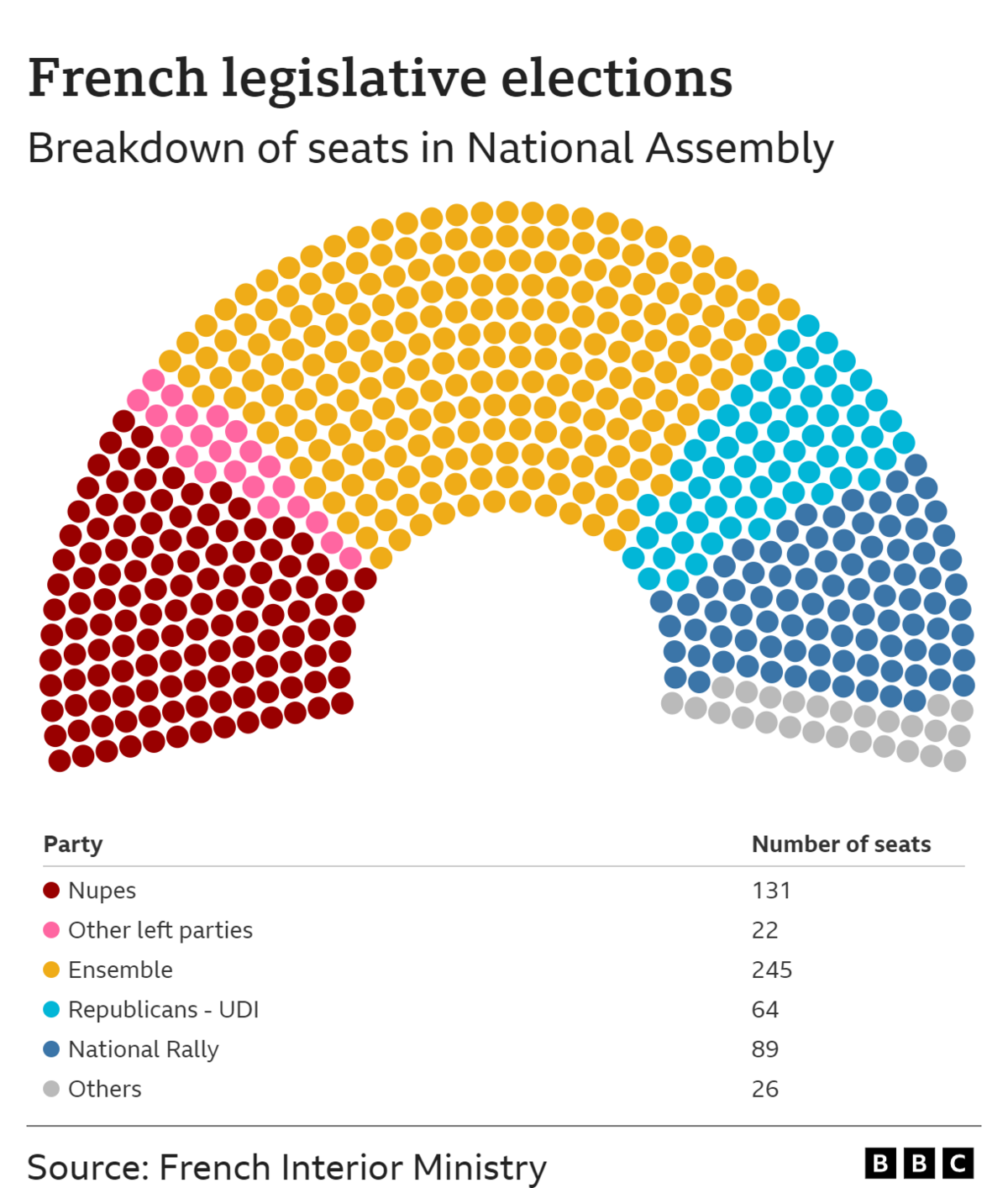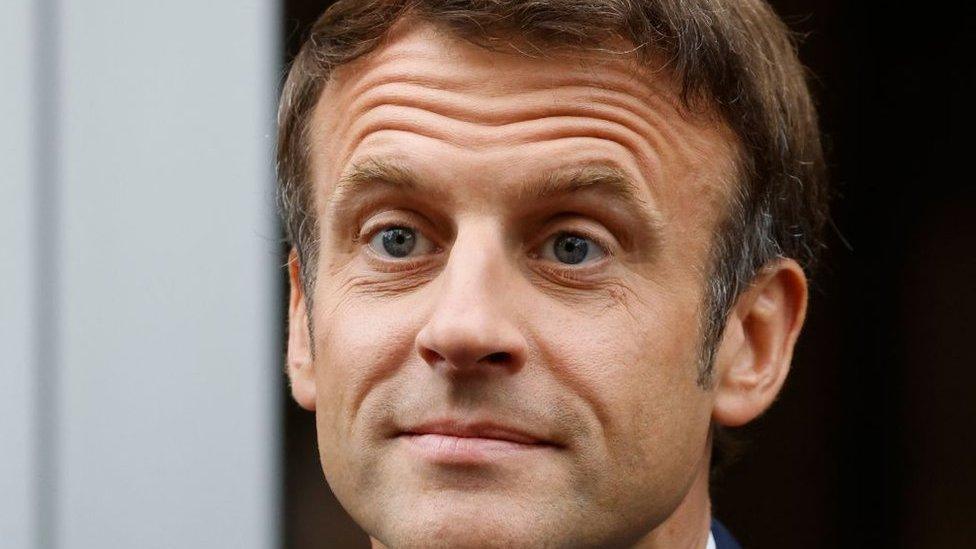French elections: What now for opposition left and far-right?
- Published

Marine Le Pen's party went from eight seats to 89 in Sunday's election
They were the big winners of France's elections, tearing apart President Emmanuel Macron's majority.
The broad left-wing alliance under Jean-Luc Mélenchon and Marine Le Pen's far right were described as a pincer movement from the extremes by our Paris correspondent Hugh Schofield.
They are poles apart but have largely the same ambition of opposing the centrist Macron government.
For veteran far-left leader Mr Mélenchon the success of the New Ecological and Social Popular Union (Nupes) was in achieving the "total rout" of an "arrogant" president in less than a month.
Winning 131 seats was a substantial achievement and he took his own France Unbowed (LFI) party from 17 seats to 79. But opinion polls had suggested Nupes could win far more and even its leader felt the results were "rather disappointing".


He had adopted the slogan "Mélenchon, prime minister", and there is no chance of that happening now even if he swears he is not leaving politics. He is no longer an elected MP and it is too early to say whether his alliance of mainstream Socialists and Greens with the far-left LFI and Communists will survive in the long term.
He has called for Nupes to become a single political grouping in the Assembly, but that's been met with a chorus of derision from the Socialists, Greens and Communists. "There was never any question of one single group," said Socialist MP Pierre Jouvet.
The surprise of the elections was the success of Marine Le Pen's far right National Rally, which increased its presence in the Assembly tenfold. A look at the dark blue areas on the map shows how far they have spread from their strongholds in the deep south and Pas de Calais in the north.


Their success in 89 seats came even though Ms Le Pen was barely visible on the campaign trail in the two weeks before the vote.
And it was unexpected because traditionally her party never does well in Assembly elections due to a so-called republican front - when mainstream voters' parties pull together to stop extreme forces winning.
What changed this time was that the far right won more than half of its 108 run-offs with the Macron alliance Ensemble. "Yesterday the republican front died at a local level," said Mathieu Gallard of pollsters Ipsos.
Supporters of both left and far right loathed "Macronism" so much that they stopped voting against each other, he said.
That gives Marine Le Pen an unprecedented chance to influence politics in the National Assembly and, unlike Jean-Luc Mélenchon, she has decided to lead the party's biggest ever group of MPs.
National Rally MP Laurent Jacobelli said the Assembly had changed its face and would no longer be filled with a team of pro-Macron "yes-men" ready to accept his every proposal. "We will be a determined, constructive opposition," he said.
Both parties aim to resist the president's programme of reforms, although National Rally has said it may back measures to alleviate the cost of living crisis if their own proposals are adopted.
Where the two parties are united is in opposition to the president's bid to raise gradually the retirement age from 62 to 65. The far right wants to keep it as it is, and Nupes wants to bring the pension age down to 60.
Watch: Jean-Luc Mélenchon says Macron faces "total defeat" as he and Marine Le Pen celebrate projected gains
Related topics
- Published20 June 2022

- Published20 June 2022
